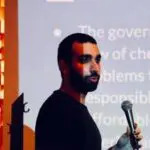INFOSHEET: The Political Economy of Anti-Syrian Hostility in Post-Crisis Lebanon
This critical review explores Lebanon’s current economic crisis and its impact on Syrian refugees, who form the largest per capita refugee population globally. It delves into rising hostility and violence towards Syrian refugees within Lebanon’s state institutions, security sectors, media, and society. By critically examining the literature on the Lebanese economy and the inclusion/exclusion of Syrian workers, the study identifies links between economic dynamics and xenophobic hate speech, and underscores how the exploitation of Syrian workers as a surplus population exacerbates social tensions.

Unlike previous studies isolating refugee issues from broader economic problems, this analysis illuminates the failings of Lebanon’s economy.
Key findings highlight a shift in class structures due to the economic crisis, attempts to valorize Lebanese identity in the labour market, the treatment of Syrian workers as surplus labour, and strategies of the ruling class to prevent working-class solidarity.
Recommendations advocate for addressing root economic causes, fostering solidarity between Lebanese and Syrian workers, and suggesting avenues for further research to inform policy and action.

